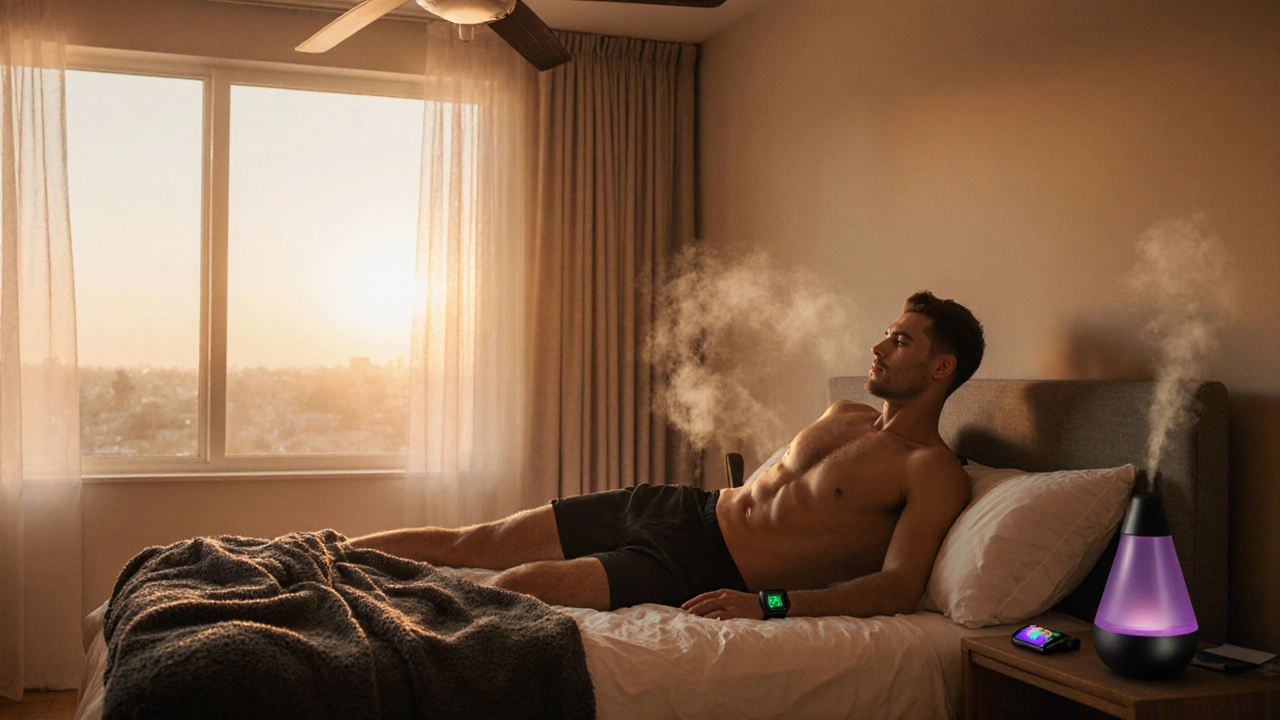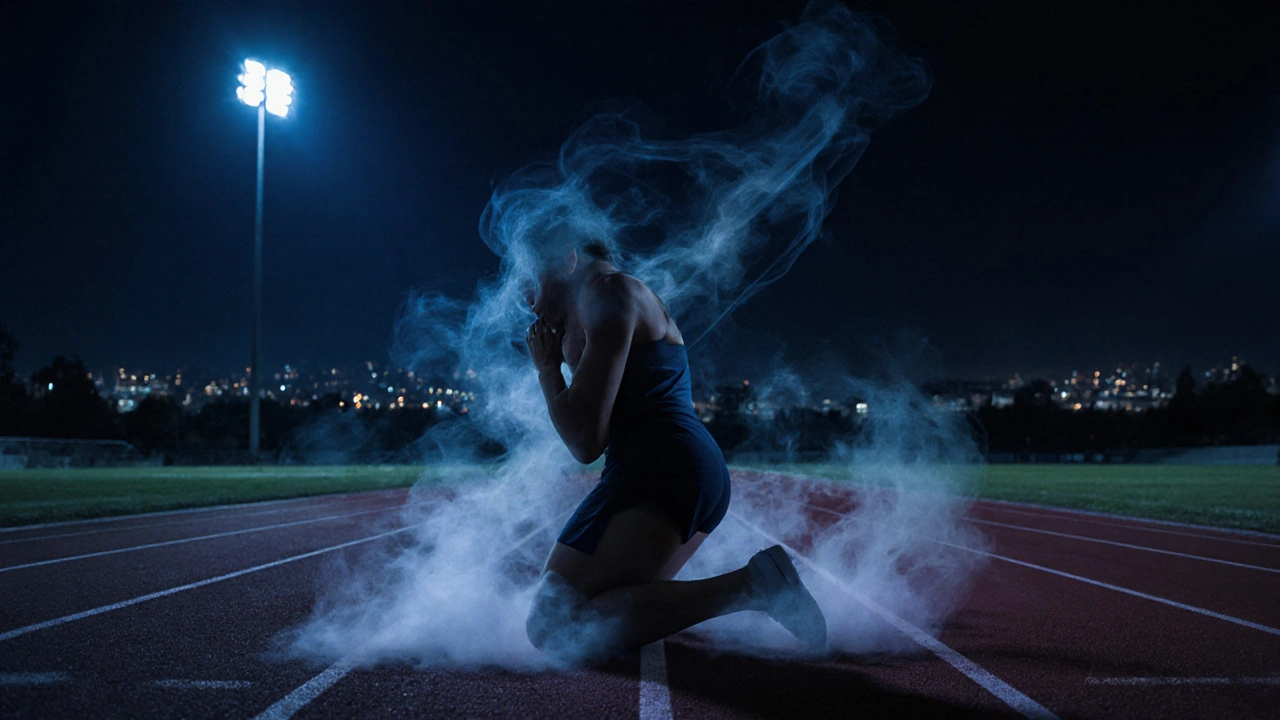Athlete Sleep Duration Calculator
This tool estimates your recommended nightly sleep duration based on your training intensity and recovery goals.
When you hear sleep disorder is a medical condition that disrupts normal sleep patterns, you might picture a person tossing and turning at night. For an athlete who relies on split‑second reactions and muscle power, the stakes are much higher. Poor sleep doesn’t just make you groggy; it can shave milliseconds off a sprint, dull focus in a game, and even increase injury risk.
Quick Takeaways
- Even a 30‑minute reduction in deep sleep can lower VO₂ max by 5%.
- Insomnia, sleep‑apnea and delayed sleep‑phase are the most common disorders in high‑performance sports.
- Consistent bedtime, controlled light exposure, and proper nutrition can restore up to 80% of lost performance.
- Professional evaluation is essential if symptoms persist for more than two weeks.
Understanding Sleep Disorders
Sleep is composed of cycles-light sleep (stage1‑2), deep slow‑wave sleep (stage3), and REM. Disruptions in any stage affect hormonal balance, memory consolidation, and tissue repair. Sleep disorders are categorized by the type of interruption:
- Insomnia: difficulty falling or staying asleep.
- Sleep‑apnea: brief pauses in breathing that cause micro‑awakenings.
- Delayed sleep‑phase syndrome (DSPS): a shifted internal clock that pushes bedtime later.
- Overtraining‑related insomnia: stress‑hormone buildup that suppresses melatonin.
Each of these interacts with an athlete’s circadian rhythm-a 24‑hour internal clock that regulates cortisol, growth hormone, and body temperature. When the rhythm is out of sync, recovery stalls.
How Sleep Directly Impacts Performance
Research from the University of Birmingham (2024) tracked 92 elite cyclists and found that a 1‑hour loss of deep sleep reduced sprint power by 3% and increased perceived exertion by 0.8 on the Borg scale. Here’s why:
- Hormonal balance: Growth hormone peaks during deep sleep; insufficient deep sleep lowers muscle‑repair rates by up to 25%.
- Neural efficiency: REM consolidates motor‑skill memory. Missed REM means slower reaction times.
- Metabolic control: Sleep deprivation raises ghrelin (hunger hormone) and lowers leptin, often leading to poor nutrition choices.
- Inflammation: Elevated cortisol and IL‑6 after poor sleep raise injury susceptibility.
Bottom line: Sleep isn’t a luxury; it’s a performance‑critical component.

Common Sleep Disorders in Athletes
| Disorder | Typical Symptoms | Performance Impact | First‑Line Intervention |
|---|---|---|---|
| Insomnia | Difficulty falling asleep, frequent awakenings | Reduced VO₂ max, slower decision‑making | Sleep‑hygiene overhaul, cognitive‑behavioral therapy |
| Obstructive Sleep‑Apnea | Loud snoring, choking‑like wakes, daytime fatigue | Impaired aerobic capacity, higher injury rate | CPAP therapy, weight management |
| Delayed Sleep‑Phase Syndrome | Late bedtime, difficulty waking for morning training | Missed training windows, reduced consistency | Chronotherapy, light‑therapy boxes |
| Overtraining‑Related Insomnia | Racing heart at night, persistent soreness | Plateaued gains, heightened perceived exertion | Periodized training, stress‑management techniques |
Practical Strategies to Optimize Rest
Below are actionable steps you can start using today.
1. Master Sleep Hygiene
- Keep bedroom temperature between 16‑19°C.
- Eliminate screens at least 30minutes before bed; use amber‑light glasses if you must train late.
- Reserve the bed for sleep only-no laptops or phones.
2. Align Training with Your Circadian Rhythm
- Schedule high‑intensity sessions when core body temperature peaks (usually 16:00‑19:00).
- Avoid heavy meals within two hours of bedtime; opt for a snack rich in tryptophan (e.g., cottage cheese).
3. Use Wearable Sleep Trackers Wisely
Devices that measure heart‑rate variability (HRV) and sleep stages can flag early signs of overtraining. Look for trackers that provide a “recovery score” and set alerts when deep‑sleep percentage drops below 20%.
4. Incorporate Relaxation Techniques
- Progressive muscle relaxation for 5minutes before lights‑out.
- Box breathing (4‑4‑4‑4) to lower sympathetic activity.
5. Nutritional Tweaks for Better Sleep
- Include 300‑500mg of melatonin from natural sources (e.g., tart cherries) if you have DSPS.
- Maintain balanced electrolytes; magnesium (300mg) supports relaxation.
6. Strategic Napping
Power naps of 15‑20minutes can boost alertness without interfering with nighttime sleep. Avoid naps later than 15:00 to keep the bedtime routine intact.
When to Seek Professional Help
If you notice any of these red flags for more than two weeks, schedule an appointment with a sports‑medicine physician or a sleep specialist:
- Persistent daytime sleepiness despite adequate time in bed.
- Loud, irregular breathing during sleep.
- Worsening performance despite training adjustments.
- Mood swings, anxiety, or depressive symptoms.
Polysomnography (overnight sleep study) can pinpoint apnea severity, while cognitive‑behavioral therapy for insomnia (CBT‑I) is the gold‑standard non‑pharmacologic treatment.
Quick Checklist for Daily Use
- Set a consistent bedtime and wake‑time, even on rest days.
- Dim lights at least 1hour before sleep; consider blue‑light blocking glasses.
- Log sleep quantity and quality in a journal or app.
- Review HRV trends weekly; adjust training load if recovery scores dip.
- Check for snoring or breathing pauses; if present, arrange a sleep study.

Frequently Asked Questions
Can caffeine before a morning workout hurt my sleep?
Yes. Caffeine can stay in your system for up to six hours, pushing your rhythm later and reducing deep‑sleep time. If you need a boost, stick to 100mg and limit it to 90minutes before bedtime.
Is it normal for elite athletes to need more than eight hours of sleep?
Absolutely. High‑intensity training increases the body’s repair demands, and most elite performers report 9‑10hours nightly to fully recover.
How can I tell if I have sleep‑apnea?
Common signs are loud snoring, gasping pauses, morning headaches, and chronic fatigue. A home‑sleep test or overnight polysomnography will confirm the diagnosis.
Should I use sleep‑tracking apps on my phone?
Phone apps can be useful for trends, but wrist‑wearables provide more accurate HRV and stage data. Combine both for a fuller picture.
What’s the best bedtime routine for a night‑owl athlete?
Gradually shift your bedtime earlier by 15‑30minutes each night, use bright‑light therapy in the morning, limit evening stimulants, and end the day with a calming activity like light stretching or reading.







Comments
Alan Clark
Wow, this guide is a real eye‑opener for anyone hitting the gym hard. Even a few tweaks to your bedtime can boost your sprint times, trust me!
Mark Anderson
Spot on, mate! I’ve seen teammates shave half a second off their 100m dash just by adding an extra 30 minutes of deep sleep. The science backing it up is solid, and the vibe you get after a good night’s rest is unbeatable. Keep spreading the word, it’ll change a lot of locker‑room cultures.
Shouvik Mukherjee
It’s great to see such a thorough rundown of how sleep ties into performance. For athletes juggling early practices and late meals, a small routine – like dimming lights an hour before bed – can gently signal the body to wind down. Also, timing protein intake closer to sleep helps muscle repair without disrupting rest. Think of sleep as just another training block; consistency beats occasional over‑sleeping.
Justin Elms
Totally agree with that. I add a quick stretch routine before bed and it seems to calm my nerves a lot. Also keep the room cool around 68°F it helps deeper sleep
Jesse Stubbs
Sleep is the unsung hero of every gold medal dream.
Melissa H.
Reading through the data on deep‑sleep loss and VO₂ max really hits home – those 5% drops feel like a whole race lost 😲. What's fascinating is how quickly hormonal swings can sabotage recovery, especially cortisol spikes after late‑night training. It reminds me that tweaking the micro‑details, like a magnesium supplement, can be a game‑changer. Sleep isn’t just downtime; it’s the engine revving up for the next session.
Edmond Abdou
Exactly, Melissa! The cortisol‑melatonin tug‑of‑war is real, and a simple night‑time magnesium dose can smooth it out 😊. Also, encouraging teammates to keep a shared sleep log builds accountability without feeling invasive.
Benjie Gillam
From a systems‑biology perspective, sleep architecture operates as a hierarchical feedback loop that modulates anabolic and catabolic pathways in elite performers. The oscillatory nature of slow‑wave sleep induces episodic bursts of growth hormone, which in turn drives satellite‑cell activation for myofibrillar repair. Concurrently, REM phases facilitate synaptic pruning and motor‑memory consolidation, thereby refining the neural circuitry underlying sport‑specific skill sets. Disruption of any stage, whether by insomnia or obstructive sleep‑apnea, propagates a cascade of dysregulated cytokines – IL‑6, TNF‑α – that elevate systemic inflammation and impair tissue resilience. Empirical studies employing polysomnography have demonstrated that athletes with sub‑optimal deep‑sleep percentages exhibit a measurable decrement in VO₂ max, on the order of 3‑5%, underscoring the physiological cost of fragmented rest. Moreover, the interplay between circadian misalignment and hypothalamic‑pituitary‑adrenal axis activation translates to heightened cortisol output, which antagonizes insulin sensitivity and fuels glycogen depletion during subsequent workouts. Intriguingly, recent metabolomic profiling reveals that sleep‑deprived athletes display altered fatty‑acid oxidation patterns, suggesting a shift toward less efficient energy substrates under conditions of chronic fatigue. From a performance analytics standpoint, integrating wearable‑derived HRV indices with sleep‑stage data yields a predictive model for over‑training risk, enabling preemptive load adjustments before performance plateaus manifest. The pragmatic implication for coaches is clear: prescribe sleep as rigorously as you would prescribe periodized volume, employing both environmental controls (temperature, light exposure) and nutritional timing (tryptophan‑rich snacks) to harmonize the homeostatic set‑point. While the literature emphasizes the macro‑benefits of 8‑10 hours, individual variability necessitates a personalized sleep‑duration calculator, akin to the one featured in the article, to fine‑tune recovery targets. For athletes contesting jet‑lag or night‑shift schedules, chronotherapy modalities-bright‑light exposure in the early morning and melatonin supplementation in the evening-can accelerate phase re‑entrainment, mitigating the detriments of delayed sleep‑phase syndrome. In sum, the convergence of endocrinology, neurophysiology, and biomechanics renders sleep an indispensable vector in the performance optimization equation; neglecting it not only erodes marginal gains but also amplifies injury susceptibility across the training continuum.
Naresh Sehgal
Bro, you just turned a simple sleep tip into a PhD thesis. Bottom line-just close the damn lights and get 8 hours, no need for all that jargon.
Poppy Johnston
I love how the article breaks down each disorder without drowning you in medical terms. It makes it easy to grab a quick tip, like using a light‑therapy box for DSPS. The checklist at the end is super handy for busy athletes who need a reminder to actually log their sleep.
Johnny VonGriz
Totally agree, Poppy. I actually printed the checklist and tape it above my nightstand. Now I check it every night before I scroll on my phone. It’s crazy how such a simple habit can keep the randomness out of my recovery.
Real Strategy PR
Everyone seems to forget that elite performance demands discipline beyond just sleeping more; it’s about a holistic lifestyle overhaul.
Doug Clayton
True that discipline is key but sleep is the foundation you can’t skip it’ll impact everything else
Michelle Zhao
Dearest readers, one must ponder the tragic irony that those who chase glory on the field often sabotage their own potential through neglect of the most primal of human necessities – repose. The quill of scientific inquiry has illuminated, with meticulous precision, the deleterious cascade that ensues when nocturnal restoration is compromised. Yet, how often do we, in our hubristic pursuit of victory, consign the very essence of recovery to the peripheries of our consciousness? It is a lamentable tableau, one that demands rectification through earnest adherence to the counsel herein presented.
Eric Parsons
Indeed, Michelle, the proverbial “golden mean” between ambition and self‑care is paramount. Implementing structured sleep hygiene protocols complements periodized training regimens, fostering sustainable performance gains.
Mary Magdalen
Listen up, folks – if you’re not sleeping like a champion, you’re basically sabotaging our national pride on the world stage. Our athletes need to dominate, and that starts with proper rest, not some half‑assed excuse about “busy schedules.”
kuldeep jangra
My dear compatriot, you raise a fiery point that resonates deeply within the fabric of our sporting spirit. It is indeed a collective responsibility to champion the cause of optimal sleep, for without it we cannot expect our athletes to rise to the pinnacle of excellence that our nation aspires to. By integrating culturally attuned sleep practices-such as traditional evening prayers followed by a technology‑free wind‑down-we can bridge modern performance science with time‑honored routines. Let us therefore pledge to embed these principles into every training facility, ensuring that the next generation of champions rests as fiercely as they compete. The victory of a well‑rested athlete is, ultimately, a triumph for the whole nation.
harry wheeler
All perspectives matter – balanced sleep, smart training and mutual respect will get us farther together